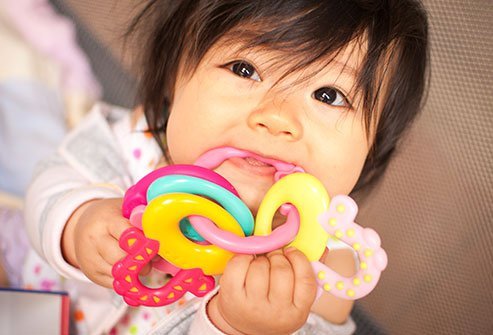What Is the Best Natural Remedy for Baby Teething Pain?

Your baby may go through the teething process without much trouble. However, if you see your baby getting cranky or uncomfortable, here are some natural remedies you can try at home to ease teething pain:
- Press gently on your baby's gums: You can use your fingers, a wet gauze, or cloth to slightly press or rub on your baby’s gums. This can help relieve pain.
- Give them cold food: If your baby has started eating solid foods, serve cold foods such as applesauce, yogurt, chilled carrot, or cucumber.
- Offer a teething ring or toy: Try teething rings or toys made from rubber. Avoid toys with small parts that your baby could choke on.
- Try teething biscuits: You can introduce teething biscuits starting at 8-12 months of age. However, don’t forget to clean and wipe your baby’s teeth to prevent plaque formation. You can even start using a toothbrush for teeth cleaning purposes.
- Wipe away drool: Saliva can irritate your baby’s face. Keep a dry cloth handy and wipe every time you see your baby drool. Use a moisturizer afterward to ward off facial dryness.
- Try pain-relieving medications: If teething pain is making your child extremely cranky, you can give them over-the-counter analgesics such as Tylenol (acetaminophen) or Advil and Children's Motrin (ibuprofen). Stay away from teething medications that contain Benzocaine., since they have been associated with a rare but serious condition known as methemoglobinemia that reduces the amount of oxygen in the blood.
- Try chamomile tea: Chamomile tea has been used as a natural remedy for thousands of years and can be tried to soothe sore gums. Read the labels when buying chamomile tea pouches, and do not buy the ones containing caffeine. You can dip your fingers in the cool tea and gently massage your baby’s gums. Do not use this remedy frequently, however, since there isn’t much data about its long-term safety in children.
When do babies begin teething?
Babies often begin teething by about 6 months, although the timing may vary.
You will notice that two bottom front teeth (lower central incisors) are usually the first to appear. Then come the two top front teeth (upper central incisors).
What are signs and symptoms of teething?
Your baby may or may not exhibit symptoms during the teething phase. Possible signs may include:
- Drooling
- Chewing on solid objects
- Crankiness
- Red and swollen gums
- Decreased appetite
Once the symptoms start, they should go away 4-7 days at a time. If they extend beyond a week or two, there may be another condition that is causing the symptoms. Talk to your pediatrician.
When to call a doctor about teething pain
Teething pain does not usually require medical help. However, if your child develops fever or any other unusual symptoms during teething, contact your pediatrician.
Do not give any homeopathic gels or tablets to your baby to help with teething, as these may cause more harm than good.

